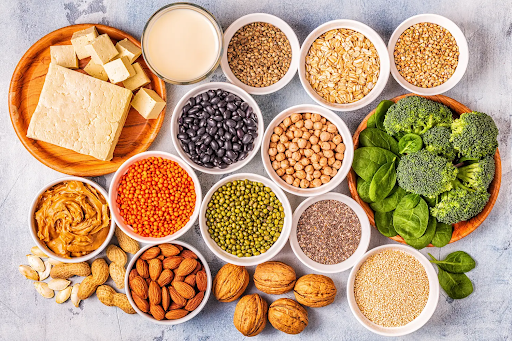10 Surprising Health Benefits of Swapping Meat for Plant Based Chicken
Everything About Healthy Food: Benefits of Embracing Plant Based Alternatives
The conversation bordering plant-based diet plans has gotten considerable interest over the last few years. Many people are discovering the possible health and wellness benefits, dietary benefits, and environmental impacts related to these nutritional selections. As people become more knowledgeable about their food's impact on wellness and sustainability, inquiries emerge about the usefulness of taking on such a way of life. What particular modifications can one expect, and just how might these options reshape not just individual health yet likewise the planet's future?
Recognizing Plant-Based Diets
Many individuals associate plant-based diet regimens mainly with vegetarianism or veganism, these diet regimens can encompass a large range of consuming patterns that prioritize whole, minimally refined plant foods. Such diet plans usually consist of fruits, vegetables, entire grains, vegetables, seeds, and nuts, while restricting or eliminating animal items. This versatility allows people to customize their dietary selections according to individual choices and nutritional requirements. Some might adopt a largely plant-based diet while still sometimes consuming meat or milk, frequently described as a flexitarian strategy. The focus stays on integrating even more plant foods, which can lead to a diverse range of dishes and tastes. Understanding these different analyses of plant-based consuming is necessary for valuing its access and appeal in contemporary food culture.
Health And Wellness Perks of Plant-Based Foods
The wellness advantages of plant-based foods are substantial, offering a nutrient thickness advantage that supports overall well-being. Research indicates that these foods can enhance heart health and wellness and play a necessary duty in reliable weight monitoring. By including extra plant-based alternatives, people might boost their nutritional options and advertise long-lasting health and wellness.
Nutrient Density Advantage
Nutrient thickness plays an essential role in the wellness advantages of plant-based foods, making them an engaging option for those seeking a balanced diet. Plant-based foods, such as fruits, veggies, beans, nuts, and entire grains, are commonly rich in important vitamins, minerals, and antioxidants while being lower in calories. This high nutrient thickness enables individuals to consume fewer calories while still meeting their dietary requirements. Additionally, these foods are packed with dietary fiber, advertising digestive system wellness and aiding in weight management. By integrating nutrient-dense plant-based alternatives, customers can boost their total health, support their body immune systems, and lower the danger of persistent diseases. Inevitably, the nutrient density of plant-based foods emphasizes their significance in a health-conscious way of life.
Heart Wellness Renovation

Weight Monitoring Support
In enhancement to advertising heart health, a plant-based diet regimen can significantly help in weight management. This nutritional method emphasizes whole foods such as fruits, veggies, legumes, nuts, and entire grains, which are normally reduced in calories and greater in fiber contrasted to animal-based products. The high fiber content assists enhance satiety, decreasing total calorie intake. In addition, plant-based diet regimens are frequently abundant in necessary nutrients while reduced in unhealthy fats, making it easier to preserve a healthy and balanced weight. Gluten Free BBQ Sauce. Research indicates that people who embrace a plant-based lifestyle have a tendency to have lower body mass indexes (BMIs) and experience more effective weight reduction contrasted to those that consume meat-heavy diet plans. Subsequently, embracing plant-based choices is a tactical choice for reliable weight monitoring
Nutritional Value of Plant-Based Active Ingredients
Plant-based ingredients are rich in important nutrients, supplying a varied range of look at this web-site vitamins, minerals, and anti-oxidants that add to total wellness. A contrast of protein resources exposes that while animal products are commonly deemed exceptional, several plant-based alternatives give appropriate protein and various other useful substances. Comprehending the dietary worth of these ingredients can aid individuals make notified nutritional options.
Crucial Nutrients in Plants
Nutrient-rich components located in plants provide a diverse variety of vital nutrients that contribute significantly to overall wellness. These ingredients are abundant in vitamins A, C, and K, which support immune feature, vision, and blood clot, respectively. In addition, plants give vital minerals such as calcium, magnesium, and potassium, critical for heart health and wellness, muscle feature, and bone stamina. The presence of fiber in plant-based foods help digestion and promotes a healthy and balanced gut microbiome. Anti-oxidants, discovered abundantly in vegetables and fruits, help battle oxidative tension and reduce swelling. Moreover, several plant foods are low in calories yet high in nutrients, making them a superb option for those looking for to preserve a healthy and balanced weight while making sure ideal nutrient consumption.
Comparing Healthy Protein Sources
Healthy protein resources differ substantially in their nutritional profiles, with plant-based components supplying unique advantages. Unlike pet healthy proteins, which commonly consist of saturated fats and cholesterol, plant proteins often tend to be reduced in these undesirable elements. Legumes, nuts, seeds, and whole grains are rich in essential amino acids, fiber, vitamins, and minerals. Lentils offer high protein web content alongside substantial iron and folate, while quinoa is a total protein, supplying all nine essential amino acids. In addition, plant-based proteins are usually gone along with by antioxidants and phytochemicals that sustain overall wellness. The shift to plant-based healthy protein sources not just enhances dietary intake however also straightens with sustainable nutritional practices, minimizing environmental effect and advertising long-lasting wellness benefits.
Ecological Impact of Plant-Based Eating
As recognition of climate adjustment grows, numerous people are checking out lasting dietary options that can substantially lessen their ecological impact. Plant-based eating has actually become a considerable factor to reducing greenhouse gas discharges, which are largely related to livestock manufacturing. The farming of fruits, grains, vegetables, and veggies commonly requires fewer resources, such as water and land, contrasted to pet farming. Additionally, plant-based diets can result in reduced deforestation, as less land is needed for grazing livestock or expanding pet feed. By changing in the direction of plant-based alternatives, consumers can support biodiversity and promote healthier environments. Generally, welcoming plant-based consuming not just advantages individual wellness yet additionally stands for a vital step toward environmental sustainability and conservation initiatives.
Conquering Common Misconceptions
While several people identify the advantages of a visit this page plant-based diet regimen, numerous false impressions often deter them from fully embracing this lifestyle. An usual idea is that plant-based diet regimens lack adequate protein; however, numerous plant resources, such as beans, nuts, and tofu, supply adequate protein. Furthermore, some assume that this diet is pricey, when actually, staples like beans, rice, and seasonal vegetables can be fairly economical. Another misconception is that plant-based consuming is extremely restrictive, whereas it actually supplies a varied range of tastes and foods. Lastly, lots of worry that a plant-based diet might result in deficiencies, yet with correct planning, people can acquire all necessary nutrients, consisting of minerals and vitamins, while delighting in a wide array of delicious dishes.
Tips for Transitioning to a Plant-Based Way of living
Making the shift to a plant-based way of living can be an enhancing experience, though it usually needs some advice to navigate the first changes. Initially, people are encouraged to begin gradually, integrating even more fruits, veggies, vegetables, and entire grains right into their meals while minimizing meat and dairy usage. Dish planning is essential; preparing an once a week food selection can aid relieve the change and avoid last-minute harmful options. Exploring brand-new recipes and cooking techniques can likewise enhance the experience and preserve enjoyment about plant-based consuming. Additionally, joining support system or neighborhoods can offer inspiration and share important suggestions. Remaining notified about nutrition assurances balanced dishes, preventing shortages while promoting a healthy and balanced, satisfying plant-based lifestyle.
:max_bytes(150000):strip_icc()/EWL-plant-based-foods-with-more-protein-than-an-egg-8424134-hero-3x2-42d27feb38e94570a6e5203bb0e4e666.jpg)
Delicious Plant-Based Dish Concepts
Discovering delicious plant-based meal ideas can influence individuals to embrace a more nutritious diet. One prominent choice is a passionate quinoa salad, including cherry tomatoes, cucumber, and a vibrant lemon-tahini dressing. Another favorite is a savory lentil stew, loaded with carrots, celery, and fragrant herbs, excellent for a comforting dinner. For morning meal, over night oats made with almond milk, chia seeds, and covered with fresh berries supply a nourishing beginning to the day. Additionally, a dynamic veggie stir-fry with tofu and a variety of vivid veggies can be a fast yet pleasing meal. Lastly, creamy avocado toast on whole-grain bread, sprayed with seasonings and seeds, supplies an easy yet delicious treat. These dishes showcase the variety and splendor of plant-based consuming.

Regularly Asked Concerns
Can a Plant-Based Diet Plan Give Enough Protein?
The question of whether a plant-based diet plan can provide sufficient healthy protein is common. Numerous sources, including beans, nuts, seeds, and whole grains, can meet protein needs successfully, sustaining a nutritious and balanced diet regimen for individuals.
Are Plant-Based Diet Plans Suitable for Kid?
The viability of plant-based diets for youngsters depends on mindful planning. Ample nutrients need to be guaranteed, consisting of proteins, vitamins, and minerals. With appropriate guidance, such diet plans can sustain healthy development and development in kids.
Just how Do I Eat in restaurants on a Plant-Based Diet plan?
Dining out on a plant-based diet plan entails seeking dining establishments with diverse food selections, asking for adjustments, and discovering vegan-friendly options. Preparation in advance and communicating dietary choices can enhance the dining experience while keeping nutritional choices.
What Prevail Irritants in Plant-Based Foods?
Common allergens in plant-based foods include soy, gluten, nuts, and seeds - Plant Based Chicken. Individuals adhering to a plant-based diet ought to know these irritants and review labels thoroughly to prevent damaging responses and assure safe consumption
Can Plant-Based Diets Aid With Weight Loss?
Research indicates that taking on a plant-based diet may help with weight management as a result of its generally lower calorie density and higher fiber content. This combination can enhance satiety, helping individuals manage their caloric intake effectively. Many people link visit the website plant-based diet regimens primarily with vegetarianism or veganism, these diets can include a vast array of consuming patterns that focus on entire, minimally refined plant foods. Nutrient density plays a necessary function in the health and wellness benefits of plant-based foods, making them a compelling choice for those looking for a well balanced diet regimen. Plant-based diet plans have been shown to significantly improve heart health, as they frequently contain components that sustain cardiovascular function. In enhancement to advertising heart health, a plant-based diet can substantially aid in weight management. An usual idea is that plant-based diets do not have enough protein; however, countless plant sources, such as legumes, nuts, and tofu, give adequate protein.